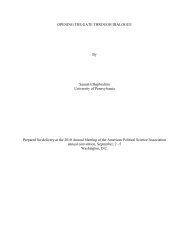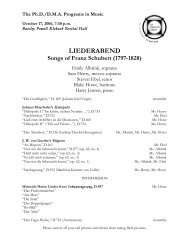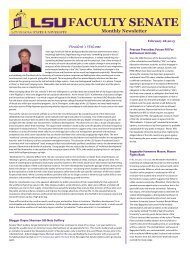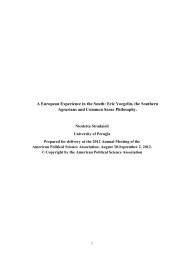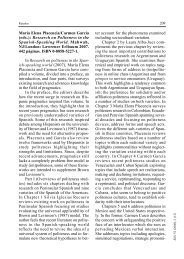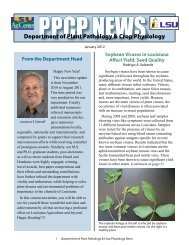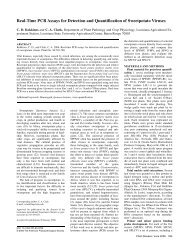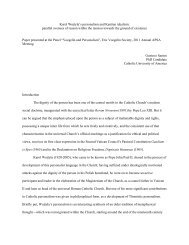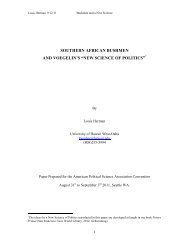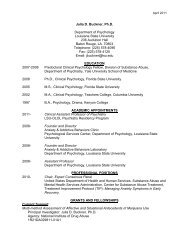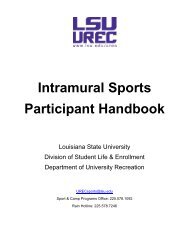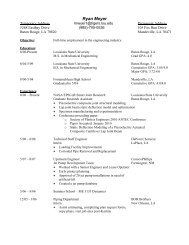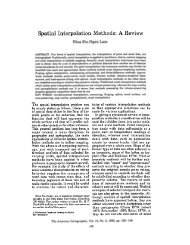FACULTY SENATE - Louisiana State University
FACULTY SENATE - Louisiana State University
FACULTY SENATE - Louisiana State University
Create successful ePaper yourself
Turn your PDF publications into a flip-book with our unique Google optimized e-Paper software.
MOVIE REVIEW (continued)<br />
Appropriately, then, he is gunned down by Dr. Schultz, i.e., by the same actor who played Landa. The good doctor is<br />
immediately shot dead in retaliation, but Django lives on, single-handedly to free Candyland’s slaves, kill its white people,<br />
and blow up the great plantation house with dynamite. He also succeeds in rescuing his beloved wife, beautifully played<br />
by Kerry Washington (the film is also a love story). Her name is Broomhilda von Shaft—yes, in addition to alluding to<br />
countless earlier movies, Tarantino also nods to Richard Wagner, arguably the aesthetic godfather of all cinema.<br />
I have no space to detail all the superb things in DJANGO UNCHAINED. I have not yet even mentioned<br />
Samuel L. Jackson’s extraordinary performance as Stephen, Calvin Candie’s head house slave and the most shattering<br />
film representation of a comprador type that I can recall. Jackson here equals an earlier performance I had thought<br />
unmatchable, his turn as the radically different character of Jules Winnfield, the hit man in PULP FICTION. But I want to end<br />
by very briefly saying what I think Tarantino is trying to do, in the largest sense, with his revenge fantasies.<br />
Art always struggles to comprehend radical evil, and sometimes the struggle seems in vain: “To write lyric<br />
poems after Auschwitz,” as Theodor Adorno famously said, “is barbaric.” The most intelligent filmmakers, it seems to me,<br />
have understood that cinema is too “lifelike” a medium—too much the “redemption of physical reality,” as the philosopher<br />
Siegfried Kracauer put it—to allow any direct representation of ultimate horror, which therefore must be approached<br />
by one or another sort of indirection. Thus, for example, SHOAH (1985), Claude Lanzmann’s great nine-and-a-half-hour<br />
documentary about the Holocaust, uses not a single frame of archival footage and makes no attempt to show the events<br />
of 1938-1945; we see the death camps as the peaceful, green, sunny rural sites they are today (or were in the 1980s), and<br />
are left to imagine for ourselves what they were like a few decades earlier. In LIFE IS BEAUTIFUL (1997), Roberto Benigni—<br />
almost incredibly—conveys, successfully, the horror of Auschwitz itself by making a comedy about it.<br />
DJANGO UNCHAINED has some humor too. Sometimes it comes as near-slapstick—as when Ku Kluxers struggle<br />
to see through misplaced eye-holes in their white hoods—but more typically the fun of the movie is a function of its<br />
metacinematic character. The way that Tarantino self-consciously plays with many particularly films, with entire film<br />
genres, with Wagnerian opera, and with actual history makes for a kind of intellectual high spirits somewhat similar to<br />
those of a Pynchon novel or a Tom Stoppard play. But the underlying intention is deadly serious. Like the Holocaust<br />
(with which Spike Lee explicitly compared it), American slavery is too horrible to be seen straight-on through the quasiimmediacy<br />
of celluloid. Tarantino engages the absolute evil that took place below the Mason-Dixon line by showing how<br />
a film about slavery must provide the audience with abundant Brechtian distraction—the distraction that he provides with<br />
the movie games of which he is the pre-eminent master, just as Lanzmann does with his distanced, low-key journalistic<br />
approach, or as Benigni does with his use of elements from the Commedia dell’arte. Since, as I have already noted in this<br />
space, the major Hollywood representations of slavery have generally been disgracefully mendacious—think of THE BIRTH<br />
OF A NATION (D. W. Griffith, 1915) or GONE WITH THE WIND (Victor Fleming, 1939)—it may not be too much to hope that<br />
Tarantino has opened a genuinely different path. With all of Tarantino’s generic deconstruction and historical fantasy, a<br />
big-budget Hollywood production about slavery has finally begun to tell the truth.<br />
UL System Wins Data Reliability Derby<br />
Although the LSU System is among the first to enjoy some of the autonomies accruing from meeting LAGRAD Act goals,<br />
the foundation of that castle of privilege may contain a few grains of sand. According to the latest internal audit from the<br />
<strong>University</strong> of <strong>Louisiana</strong> System, “the university of <strong>Louisiana</strong> System was the only System to have 100% of its institutions<br />
judged as ‘reliable’ in terms of GRAD Act data.” It appears that UL System President Sandra Woodley’s fame for efficient data<br />
management has led to another victory. True, the audit report turned up a few vacillations on the campuses—McNeese<br />
and Grambling students, it seems, have been scheduling work during class time, and auxiliary services at ULM continue<br />
to battle management and procedure problems—but the attainment of data reliability in a critical as well as politically<br />
sensitive area merits robust applause.<br />
Bookit Still Stuck on the Blotter<br />
Those who travel on state funding are all too familiar with the shortcomings of the mandated state travel provider, Short’s<br />
Travel Management. Travelers who book online must wade through a clumsy “badge” display that makes comparison<br />
shopping all but impossible; those browsing for fares must work within three-hour schedule windows that obstruct the<br />
discovery of the least expensive travel times; those wishing to book hotels near a destination find no convenient way to<br />
enter an address that the system will identify; worst of all, those who discover a better fare elsewhere must wait so long<br />
for an exemption from the requirement to use Short’s that the better fare often disappears while approval is pending.<br />
Confronted with the poverty of both its database and its interface, Short’s has developed a new utility, “Bookit,” that<br />
compensates for Short’s shortfalls. “Bookit” resides as an “app” in browsers such as Firefox and Explorer. When a user<br />
selects an itinerary from an online travel provider such as Expedia or Travelocity,<br />
the “Bookit” window appears, whereupon the entry of identifying information results<br />
in the transmission of the travel proposal to Short’s. Short’s then emails the user a<br />
Short’s approved version of the itinerary that qualifies for state travel reimbursement.<br />
Although it does (occasionally) work, this Rube Goldberg mechanism requires that<br />
state travelers do extra work to compensate for Short’s inadequacies, is limited to a<br />
handful of travel sites that allow itinerary sharing, does not work with the “ITA”<br />
database that Short’s itself recommends, and is advertised through an instructional<br />
video that, at Newsletter press time, was no longer functioning. Even more extraordinarily,<br />
users of “Bookit” pay not the $5.00 online booking fee, but an additional $19.00 “Bookit fee,”<br />
which a less polite user might dub a “Short’s Incompetence Fee.”<br />
Bookit App to Patch<br />
your Shorts<br />
ULL Faculty Leader Leslie Bary<br />
Analyzes Faculty Governance<br />
Leslie Bary, a leader among faculty governance<br />
personnel at the <strong>University</strong> of <strong>Louisiana</strong> at Lafayette,<br />
has released a thoughtful evaluation of faculty<br />
governance in contemporary universities in which the<br />
recent history of the ULL Faculty Senate appears as a<br />
case study. Published in the AAUP journal Academe,<br />
Bary’s detailed commentary urges a reassertion of the<br />
faculty role in university governance and also warns<br />
that revisions of faculty governance procedures, rules,<br />
bylaws, or constitutions require careful scrutiny lest<br />
faculty protections and, indeed, faculty prominence<br />
quietly slip away. Bary’s superb column is available<br />
online. The prolific Bary has also issued an online<br />
posting in which she analyzes the drive toward MOOCs<br />
(massively open online courses). She considers the<br />
foundations on which the typical MOOC and discovers<br />
that even a successful MOOC requires the same<br />
infrastructure as do traditional courses. Universities, it<br />
seems, will only achieve a successful online presence<br />
when they take such traditional steps as upgrading<br />
libraries, restoring sabbaticals for faculty development,<br />
and encouraging study abroad. Read Leslie’s posting<br />
at the online magazine Remaking the <strong>University</strong>.<br />
<strong>Louisiana</strong> Librarians Sponsor ALA Bill<br />
Reader Stephanie Braunstein, one of <strong>Louisiana</strong>’s<br />
leading higher education librarians, reports success<br />
in the passage, at the recent ALA (American Library<br />
Association) convention, of a resolution supporting<br />
the two librarians who had been sued for making<br />
evaluative comments about the subsidy-driven Edwin<br />
Mellen Press. Extending the range of <strong>Louisiana</strong>’s<br />
Faculty Senate, Braunstein sponsored a similar<br />
resolution in the LSU Faculty Senate, a resolution which<br />
elicited a corroborating resolution from no less that the<br />
<strong>University</strong> of California system-wide faculty parliament.<br />
Applause to you, Stephanie, for showing the power of<br />
<strong>Louisiana</strong>’s libraries.<br />
LSU HRM Unveils Sleek New Web Site<br />
Long-term readers of the Newsletter will remember<br />
that, a few years ago, the LSU Human Resources<br />
Management (“HRM”) web site topped the list of<br />
<strong>Louisiana</strong>’s worst academic web sites. Now, under<br />
the guidance of HRM chieftain A G Monaco, LSU<br />
employees can enjoy and profit from using a brand<br />
spanking new web portal that is festooned with<br />
colorful imagery and rich in easy-to-use and intuitively<br />
labeled links. Rather than the bewildering<br />
“wheel of fortune” layout that<br />
baffled users for most of<br />
the early Internet age,<br />
the new web site features large<br />
buttons that would be easy<br />
for even the Bear Named<br />
Paddington to push! This new<br />
web site surely merits the<br />
“most improved” award for<br />
collegiate web site design.<br />
Big Buttons Emblazon<br />
LSU’s HRM Web Site



